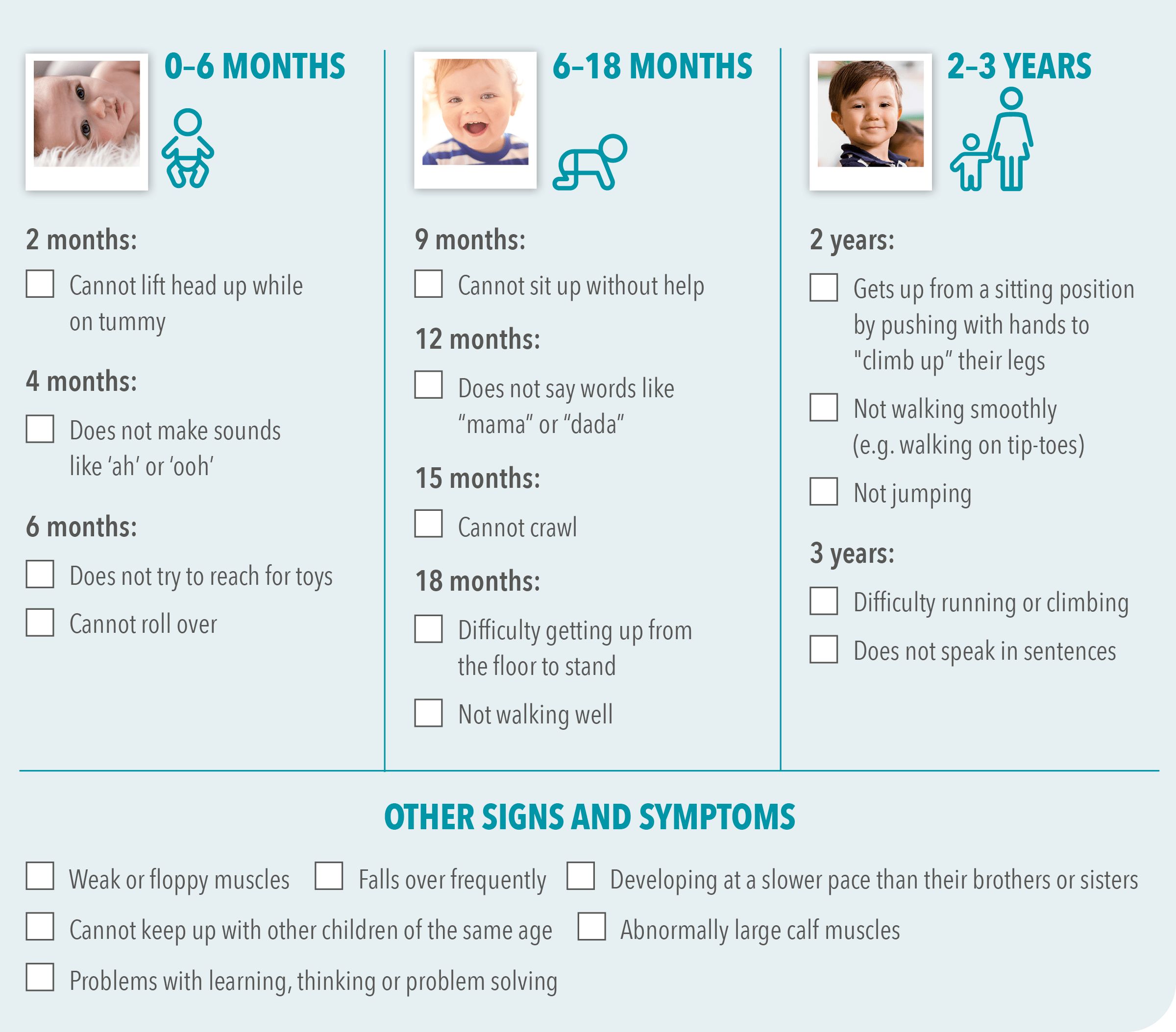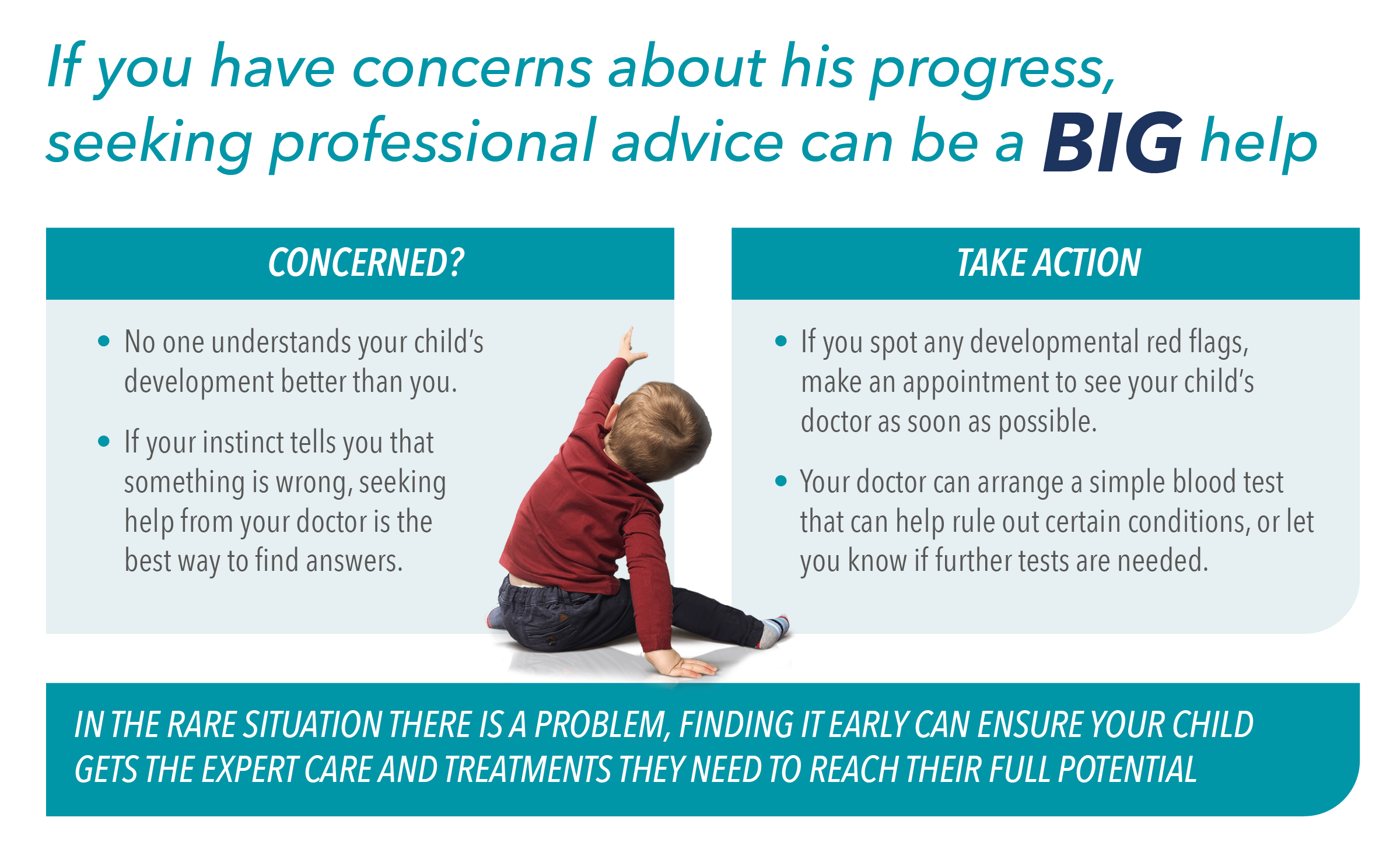Could it be DMD?
Being aware of the different signs and symptoms of DMD (and when they occur during a child’s development), can help parents and carers quickly identify when particular developmental milestones aren’t met, and when to suspect that further help may be needed.2–4
It is important to identify whether a child has DMD as soon as possible in their development, as treatment is more effective when it is started in the early stages of the disease.1–3
Find out why early diagnosis of DMD matters
In the animated video, a mother describes how her child came to be diagnosed with DMD and why early diagnosis was so important.
What are the signs and symptoms of DMD?
One of the early indictors for DMD is when a child does not reach developmental milestones, such as lifting their head, sitting, walking and talking when expected.1–3
If a child is not walking well by 18 months, or cannot get up from the floor to stand, it may be a sign of a problem with their muscles.2,5,6
Other signs may include:2,3,6,7
- Weak muscles
- A delay in learning to speak
- Behavioural issues
- Getting tired easily
- Developing at a slower pace than their siblings
- Not being able to keep up with other children their age
The checklist below can be used to help identify developmental concerns early, so a child can receive the help and support they need as soon as possible.

Could it be another type of muscular dystrophy?
Although DMD is the most common form of muscular dystrophy (MD), other types exist, generally characterised by the muscle groups they affect and the age at which symptoms start:7
- Becker MD has similar signs and symptoms as DMD, but they tend to be milder and begin in the teens or early 20s7
- Myotonic MD stops muscles from relaxing following contractions, with facial and neck muscles often affected first. Patients typically have long, thin faces, drooping eyelids and swanlike necks7,8
- Facioscapulohumeral MD causes muscle weakness, typically beginning in the face and shoulders. It’s generally first noticed in teenage years, but can begin in childhood or as late as age 407,8
- Congenital MD presents in both boys and girls as muscle weakness at birth or before 2 years of age. It may be mild and progress slowly, or progress rapidly and cause severe impairment7,8
- Limb-girdle MD usually begins in childhood or teenage years, with hip and shoulder muscles affected first. Those affected may trip frequently, due to weakness in the front part of their feet7,8
What should you do if you think your child has DMD?
If you have any concerns about your child’s development, talk to your doctor as soon as possible.
As a parent, you see how your child is developing every day. Feeling that something may be wrong – but not knowing what – can be very stressful.4
As the first physical symptoms of DMD may be hard to recognise, it can be difficult to diagnose.9,10 To help your child’s doctor determine whether it is DMD or another condition, take these three steps when preparing for an appointment:

Write down your family history
Understanding your family’s history of muscle disease and other conditions can help your doctor reach a diagnosis.

Take photos or video
Bring photos or videos to help your doctor gain a better understanding of the signs and symptoms you have observed.

Keep a journal of your child’s symptoms
Write down any symptoms you have noticed and when these happen.
Use the Doctor’s appointment discussion guide to support you in your conversations with the doctor and ensure you get the information you need.


Duchenne muscular dystrophy diagnosis
Early diagnosis of DMD is important, find out more on how this is done.

Genetic counselling
Genetic counselling can help guide you through the genetic testing process in DMD and also offer emotional support.

Duchenne muscular dystrophy treatment
While there is currently no cure for DMD, there are various treatments that can help protect the muscles and ease symptoms.

The ultimate guide to Duchenne muscular dystrophy
Everything you need to know about DMD, all in one place.
References
- van Ruiten HJ, et al. Arch Dis Child. 2014;99:1074–1077.
- Birnkrant DJ, et al. Lancet Neurol. 2018;17:251–267 [Part 1].
- Lurio JG, et al. Am Fam Physician. 2015;91:38–44.
- Centers for Disease Control and Prevention. Milestones Matter. Available at https://www.cdc.gov/ncbddd/actearly/pdf/parents_pdfs/milestonemomentseng508.pdf [last accessed September 2022].
Reference 5. World Health Organization. Six gross motor milestones. Available at https://cdn.who.int/media/docs/default-source/child-growth/child-growth-standards/indicators/motor-development-milestones/mm_windows_table.pdf?sfvrsn=cb31ec78_5 [last accessed September 2022]. - National Task Force for Early Identification of Childhood Neuromuscular Disorders. Guide for primary care providers. Available at https://childmuscleweakness.org/wp-content/uploads/2019/05/PrimaryCareProviderPacket.pdf [last accessed September 2022].
- Mayo Clinic. Muscular dystrophy: Symptoms & Causes. Available at https://www.mayoclinic.org/diseases-conditions/muscular-dystrophy/symptoms-causes/syc-20375388 [last accessed September 2022].
- Eunice Kennedy Shriver National Institute of Child Health and Human Development. Muscular dystrophy. Available at https://www.nichd.nih.gov/health/topics/factsheets/musculardys [last accessed September 2022].
- Sussman M. J Am Acad Orthop Surg. 2002;10:138–151.
- Ciafaloni E et al. J Pediatr. 2009;155:380–5.
© 2022 PTC Therapeutics.
GL-DMD-0657 | October 2022